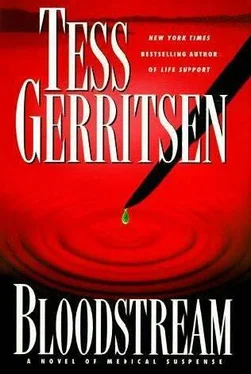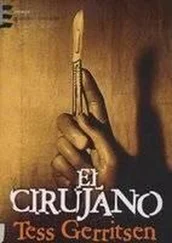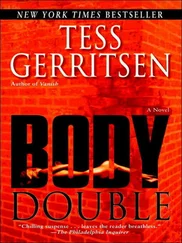“Yes.”
“And you believe there’s a biological reason for it?”
“It has something to do with that lake. It’s some sort of natural phenomenon. A bacteria, or an algae.”
“What about my theory? That this is another Flanders, Iowa?”
“It’s not drug abuse, Mitchell. I thought we’d turned up something in both boys’ blood-an anabolic steroid of some kind. But the final tox screens on both of them came back negative. And Taylor denies any drug abuse.”
“Kids do lie.”
“Blood tests don’t.”
They pulled into her driveway, and he turned to look at her. “You’ve picked an uphill fight, Dr. Elliot. Maybe you didn’t sense the depth of anger in that room, but I certainly did.”
“Not only did I sense it, I have four slashed tires to prove it.” She stepped out. “Thank you for the ride. Now you owe me something.”
“Do I?”
“The name of the cop who’s been talking to Damaris Horne.”
He gave an apologetic shrug. “I don’t know his name. All I can tell you is that I’ve seen them together in, shall we say, close contact. Dark hair, medium build. Works the night shift.”
She nodded grimly. “I’ll figure it out.”
Lincoln climbed the stairs to the handsome Victorian, each step bringing him closer to exhaustion. It was well past midnight. He had spent the last few hours at an emergency meeting of the Board of Selectmen, held at Glen Ryder’s house, where Lincoln had been told in no uncertain terms that his job was in jeopardy.
The board had hired him, and they could fire him. He was an employee of the Town of Tranquility, and therefore a guardian of its welfare. How could he sup port Dr. Elliot’s suggestion to close down the lake?
I was just stating my honest opinion, he’d told them.
But in this case, honesty was clearly not the best policy.
What had followed was a mind-numbing litany of financial statistics, provided by the town treasurer. How much money came in every summer from tourists. How many jobs were created as a result. How many local businesses existed only to service the visitor trade.
Where Lincoln’s salary came from.
The town lived and died by Locust Lake, and there would be no calls to close it, no health alerts, not even a whisper of public debate.
He’d left the meeting uncertain whether he still had a job, uncertain whether he even wanted the job. He’d climbed into his cruiser, had been halfway home, when he’d received the message from Dispatch that someone else wanted to speak to him tonight.
He rang the bell. As he waited for the door to open, he glanced up the street and saw that every house was dark, all the curtains drawn against this black and frigid night.
The door swung open, and Judge Iris Keating said: “Thank you for coming, Lincoln.”
He stepped into the house. It felt airless, suffocating. “You said it was urgent.”
“You’ve already met with the board?”
“A little while ago.”
“And they won’t consider closing the lake. Will they?”
He gave her a resigned smile. “Was there any doubt?”
“I know this town too well. I know how people think, and what they’re afraid of.
How far they’ll go to protect their own.”
“Then you know what I’m dealing with.”
She gestured toward the library. “Let’s sit down, Lincoln. I have something to tell you.”
A fire was dying behind the grate, only a few listless flames puffing up from the mound of cinders. Still, the room felt overwarm, and as Lincoln sank deeply into an overstuffed chair, he wondered if he could summon the energy to stay awake. To rise to his feet again and walk back out into the cold. Iris sat across from him, her face illuminated only by the fire’s glow. The dim light was kind to her features, deepening her eyes, smoothing the wrinkles of sixty-six years into velvety shadow. Only her hands, thin and gnarled by arthritis, betrayed her age.
“I should have said something at the meeting tonight, but I didn’t have the courage,” she confessed.
“Courage to say what?”
“When Claire Elliot spoke about the lake-about the night she saw the water glow-I should have added my voice to hers.”
Lincoln sat forward, the meaning of her words at last piercing his fatigue.
“You’ve seen it too.”
“Yes.”
“When?”
She looked down at her hands, grasping the armrests. “It was in late summer. I was fourteen years old, and we had a house by the Boulders. It’s gone, now. Torn down years ago.” Her gaze shifted to the fire and remained there, focused on the sputtering flames. She leaned back, her hair like a halo of silver against the dark fabric of the chair. “I remember that night, it was raining hard. I woke up, and I heard thunder. I went to the window, and there was something in the water. A light. A glow. It was there for only a few minutes, and then…“ She paused. “By the time I woke my parents, it was gone, and the water was dark again.” She shook her head. “Of course they didn’t believe me.”
“Did you ever see the glow again?”
“Once. A few weeks later, also during a rainstorm. Just the briefest shimmer, and then nothing.”
“The night Claire and I saw it, it was raining hard, too.”
Her gaze lifted to Lincoln’s. “All these years, I thought it was lightning. Or a trick of the eyes. But then tonight, for the first time, I learned I’m not the only one who’s seen it.”
“Why didn’t you say something? The town would have listened to you “And people would ask all sorts of questions. When I saw it, which year it was.”
“Which year was it, Judge Keating?”
She looked away, but he saw the flash of tears in her eyes. “Nineteen forty-six,” she whispered. “It was the summer of ‘46.”
The year Iris Keating’s parents had died at the hands of her fifteen-year-old brother. The year Iris, too, had killed, but in self-defense. She had pushed her own brother through the turret window, had watched him fall to his death.
“You understand now why I didn’t speak,” she said.
“You could have made a difference.”
“No one wants to hear about it. I don’t want to talk about it.”
“It was so long ago. Fifty-two years-”
“Fifty-two years is nothing! Look at how they still treat Warren Emerson. I’m just as guilty of it. When we were children, he and I were so close. I used to think that someday, we would…“ She suddenly stopped. Her gaze settled on the fire, by now little more than glowing ashes. “All these years, I’ve avoided him.
Pretended he didn’t exist. And now I hear it may not have been his fault at all, but merely a sickness. An infection of the brain. And it’s too late to make it up to him.”
“It’s not too late. Warren had surgery last week, and he’s fine now. You could visit him.”
“I don’t know what I’d say after all these years. I don’t know that he’d want to see me.”
“Let Warren make that decision.”
She thought it over, her eyes glistening in the dying light of the embers. Then she rose stiffly from the chair. “I believe the fire’s gone out,” she said. And she turned and left the room.
There was a car parked in Lincoln’s driveway.
He pulled up behind it and groaned. Though he had not been home all day, the lights were on in his living room, and he knew what awaited him inside the house. Not again, he thought. Not tonight.
He trudged up the steps to his porch and found the front door was unlocked. When had Doreen stolen his new key?
He found her asleep on the couch. The sour stench of liquor permeated the room.
If he woke her now, there would be another drunken scene, crying and shouting, neighbors awakened. Better to let her sleep it off, and deal with it in the morning when she was sober and he wasn’t reeling from exhaustion. He stood looking down at her, regarding, with a sense of sad bewilderment, the woman he’d married.
Читать дальше
Конец ознакомительного отрывка
Купить книгу












